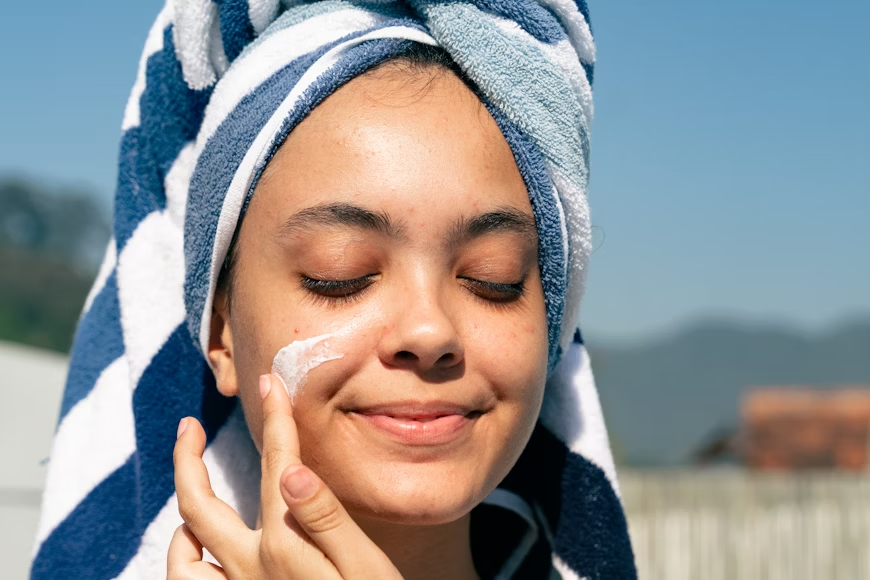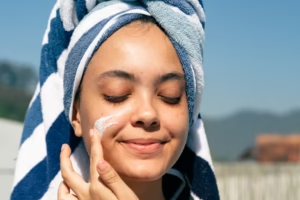Hormonal acne is more than just a skin issue—it’s a sign of internal imbalance. Often triggered by fluctuations in hormones like androgens, estrogen, or cortisol, this type of acne can be particularly persistent and emotionally draining. While it most commonly affects women during menstruation, pregnancy, or menopause, hormonal acne doesn’t discriminate by age or gender. Unlike typical acne, which can often be treated with topical solutions, hormonal acne requires a more comprehensive and natural approach to tackle its root cause.
Modern treatments may offer temporary relief, but many come with side effects or don’t address the underlying issues. This has led many people to seek natural remedies that restore hormonal balance while nourishing the skin from within. Fortunately, nature offers a variety of effective solutions—from diet and herbs to lifestyle changes and skincare rituals. In this guide, we’ll explore scientifically supported and holistic ways to manage and defeat hormonal acne naturally, helping you reclaim clear, glowing skin without harsh chemicals.
1. Anti-Inflammatory Diet: The Foundation of Clear Skin
A poor diet loaded with refined sugar, dairy, processed foods, and unhealthy fats can disrupt hormone levels and trigger acne flare-ups. To counter hormonal imbalance, adopting an anti-inflammatory and hormone-supporting diet is key. Start by eliminating or reducing foods with a high glycemic index, such as white bread, soda, sugary snacks, and fast food. These foods spike insulin levels, leading to increased sebum production and clogged pores.
Instead, opt for a whole-foods diet rich in fiber, antioxidants, and essential fatty acids. Leafy greens, cruciferous vegetables (like broccoli and kale), omega-3-rich foods (like walnuts, flaxseeds, and salmon), and colorful fruits all help reduce inflammation and support liver detoxification—essential for clearing excess hormones. Fermented foods like kimchi, kefir, and sauerkraut improve gut health, which plays a critical role in hormonal regulation.
Additionally, drinking plenty of water infused with lemon or mint flushes toxins and aids in hydration—crucial for skin clarity. Include zinc-rich foods such as pumpkin seeds and chickpeas, as zinc helps regulate oil production and heal acne lesions. Remember, consistency is key; give your body several weeks to respond to dietary changes before expecting visible results.
2. Herbal Support: Nature’s Hormone Balancers
Herbs have been used for centuries in Ayurvedic and traditional medicine to restore hormonal balance and improve skin health. One of the most celebrated is vitex (chasteberry), which supports the pituitary gland in regulating estrogen and progesterone levels—especially beneficial for premenstrual acne. Spearmint tea has been shown in studies to lower testosterone levels, making it a gentle yet effective remedy for women with androgen-dominant acne.
Another powerhouse is licorice root, which contains compounds that inhibit testosterone while reducing inflammation. Similarly, DIM (Diindolylmethane), a plant compound found in cruciferous vegetables, helps metabolize excess estrogen in the body and can be taken as a supplement to support hormonal detoxification.
Turmeric, a natural anti-inflammatory, helps calm inflamed acne lesions and supports liver health, making it a two-pronged remedy. Ashwagandha, an adaptogenic herb, balances cortisol levels and mitigates stress-induced acne. When using herbs, it’s crucial to consult with a holistic practitioner or functional medicine expert to ensure proper dosages and combinations suited to your body’s needs.
3. Natural Skincare Rituals: Support from the Outside In
While internal health plays a central role in hormonal acne, your external skincare routine can either support or sabotage your progress. Harsh chemical-laden cleansers and treatments can strip the skin’s natural barrier, causing increased oil production and breakouts. Switch to gentle, non-comedogenic cleansers with ingredients like tea tree oil, aloe vera, and witch hazel, all known for their antibacterial and calming properties.
Incorporate exfoliants with salicylic acid or natural fruit enzymes 2-3 times a week to unclog pores and remove dead skin cells without irritating the skin. Avoid over-washing, which can cause the skin to overproduce oil. Instead, focus on balancing and hydrating the skin using oils like jojoba or rosehip seed oil, which mimic the skin’s natural sebum and help reduce acne scars over time.
Using clay masks with bentonite or kaolin clay once a week helps absorb excess oil and draw out impurities. Don’t underestimate the importance of sun protection—opt for mineral-based sunscreens that contain zinc oxide, which not only blocks harmful UV rays but also soothes inflamed skin.
Most importantly, make your skincare routine a consistent ritual—morning and evening—so your skin remains supported, protected, and nurtured every day.
4. Stress Management and Sleep: Invisible Triggers You Must Tame
One of the most underestimated contributors to hormonal acne is chronic stress. Elevated cortisol levels interfere with the balance of other hormones, triggering excess sebum production and inflammation. Managing stress is not a luxury—it’s a necessity for hormonal health and skin clarity.
Incorporate mindfulness practices like meditation, deep breathing, and yoga into your daily routine. These techniques lower cortisol and help the body return to a balanced state. Even just 10–15 minutes a day can make a profound difference in your skin’s appearance and your overall sense of well-being.
Sleep is another cornerstone of hormonal balance. Aim for 7–9 hours of restful sleep each night, as this is when your body undergoes the most repair, including hormonal recalibration and skin regeneration. Poor sleep increases inflammation and disrupts the endocrine system, making acne worse.
Support your circadian rhythm by avoiding screens an hour before bed, dimming the lights in the evening, and creating a calming bedtime routine with herbal teas like chamomile or passionflower. If needed, natural supplements like magnesium glycinate or melatonin can aid sleep quality, but always consult a healthcare provider before starting new supplements.
5. Detoxification and Gut Health: The Final Piece of the Puzzle
Hormonal acne often stems from the body’s inability to eliminate excess hormones efficiently, and this is where detoxification becomes essential. Your liver, colon, and kidneys are responsible for breaking down and excreting used hormones. If these pathways are sluggish, hormones like estrogen can recirculate in the body, triggering acne.
Support your liver with detoxifying foods like beets, dandelion greens, milk thistle, and lemon water. Consider a gentle liver cleanse under professional guidance if symptoms are persistent. Equally important is daily bowel movement—staying regular prevents the reabsorption of toxins. Fiber from fruits, vegetables, and flaxseeds can help with this.
The gut microbiome plays a central role in hormonal balance, too. Imbalanced gut bacteria can lead to increased inflammation and impaired estrogen metabolism. Taking a high-quality probiotic and consuming fermented foods daily can help restore a healthy gut environment.
Avoid unnecessary medications like antibiotics and birth control pills unless absolutely needed, as they disrupt gut flora and hormonal feedback loops. Instead, focus on natural detox support, hydration, and gut-healing protocols that promote long-term hormonal and skin health.
Conclusion: Embrace a Holistic Approach for Lasting Clear Skin
Hormonal acne can be stubborn, but it is not unbeatable. By embracing a holistic and natural approach, you can work with your body rather than against it. A nutrient-dense diet, hormone-balancing herbs, a gentle skincare regimen, consistent stress management, and proper detoxification all play pivotal roles in restoring hormonal harmony and achieving radiant skin.
It’s important to remember that natural remedies take time to work. Unlike quick fixes, these strategies offer sustainable, long-lasting results without compromising your health. With patience, consistency, and self-care, clear and glowing skin is entirely within reach—naturally.








